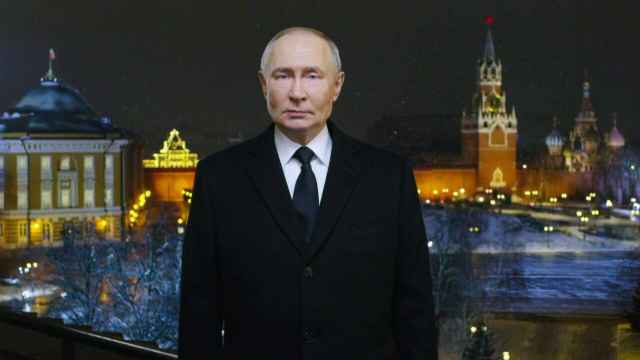SOCHI — The country's banks could lose about 350 billion rubles ($12 billion) in the event of a serious debt shock in the euro zone, but stress tests show that they would withstand the blow, a Central Bank official said.
The tests showed that exposure to foreign assets was low relative to the overall size of domestic bank portfolios, said Sergei Moiseyev, deputy head of the bank's financial stability.
The comments appeared after European politicians rejected an International Monetary Fund call for banks to raise up to 200 billion euros ($290 billion) in new capital to prevent a new world recession.
"In the event of a serious shock in Europe, losses for Russian banks would be smaller than their annual profits, which would help them cover losses stemming from market risks," Moiseyev said in comments embargoed for release on Monday, based on tests carried out at the end of the first half of the year.
As of July 1, Russian banks held 452 billion rubles in foreign bonds, just over 10 percent of their fixed-income portfolios, the tests showed. They owned 8.3 billion rubles of foreign stocks, a little more than 1 percent of their share holdings.
He did not give a breakdown by region.
Europe's top bankers were meeting in Frankfurt on Monday to share insights on whether the latest sovereign debt crisis squall could turn into a financial market storm.
"We see the main threat not from the United States but from European markets ... in terms of market risks on securities holdings," Moiseyev said.
Russian banks earned over 500 billion rubles in the first seven months of 2011, edging closer to last year's level of 570 billion, meaning that the lenders have enough cash to cover potential losses, he said the tests showed.
Losses on banks' entire bond portfolios under the stress test scenario would reach 290 billion rubles, or 6.8 percent. Foreign losses would reach 10 percent, or 45 billion rubles, according to Moiseyev.
Banks would lose 8.7 percent on their entire stock portfolios, or 61 billion rubles. Of that, losses on foreign stocks would be 1.2 billion rubles, representing a loss of 14.5 percent.
Moiseyev said a 10 percent fall in European stocks would translate into losses of at least 8 percent on Russian stocks.
Russia's benchmark MICEX Index has lost 13 percent since the beginning of August, while FTSEurofirst 300 was down 14 percent.
European banks that are considered to be at risk from a major debt shock, Moiseyev said, own only four lenders among Russia's 1,000 plus banks.
"There is enough liquidity at the moment — a little less than 13 percent of overall assets. The Central Bank is ready to inject over 3 trillion rubles via repo auctions [if needed]," he said.
The Central Bank uses repo auctions to support liquidity in the banking sector, with the tool popular among banks that do not have sufficient credit lines with their peers.
Pavel Gurin, chairman of Raiffeisenbank in Russia, died Monday, Bloomberg reported. The bank’s supervisory board will meet soon to discuss a successor to Gurin, who had headed the lender since September 2008.
A Message from The Moscow Times:
Dear readers,
We are facing unprecedented challenges. Russia's Prosecutor General's Office has designated The Moscow Times as an "undesirable" organization, criminalizing our work and putting our staff at risk of prosecution. This follows our earlier unjust labeling as a "foreign agent."
These actions are direct attempts to silence independent journalism in Russia. The authorities claim our work "discredits the decisions of the Russian leadership." We see things differently: we strive to provide accurate, unbiased reporting on Russia.
We, the journalists of The Moscow Times, refuse to be silenced. But to continue our work, we need your help.
Your support, no matter how small, makes a world of difference. If you can, please support us monthly starting from just $2. It's quick to set up, and every contribution makes a significant impact.
By supporting The Moscow Times, you're defending open, independent journalism in the face of repression. Thank you for standing with us.
Remind me later.





